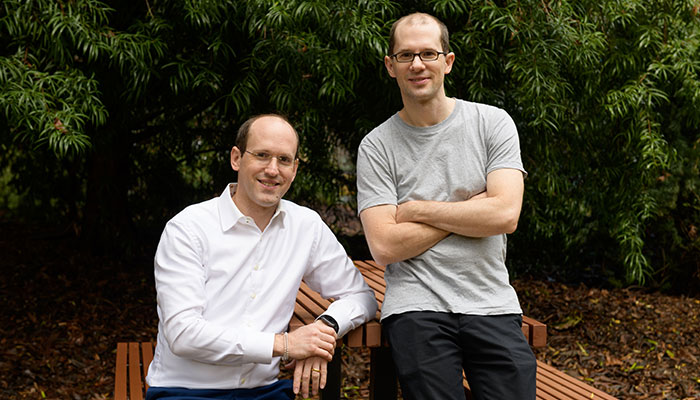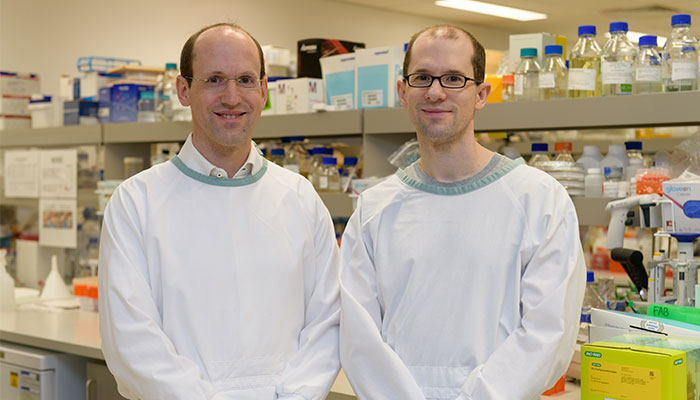A ground-breaking new treatment developed by Macquarie University scientists has reversed the effects of memory loss associated with Alzheimer’s disease in a study of mice with advanced dementia.
Breakthrough: Brothers and dementia researchers Lars (left) and Arne Ittner in the laboratory at Macquarie University.
The treatment works by focusing on a naturally protective enzyme in the brain called p38gamma, which when activated prevents the toxic effects of memory loss.
The discovery has huge implications for the treatment not only of Alzheimer’s, but other dementia-related diseases such as fronto-temporal dementia, which affects younger people in their 40s and 50s. Dementia is the leading cause of death of women and the second leading cause of death of all Australians.
Brothers Lars and Arne Ittner, from Macquarie's Dementia Research Centre, have been studying dementia treatments for more than a decade but the breakthrough came when Arne discovered that the gene therapy was able to impact a protective enzyme in the brain with outstanding impacts on memory in advanced dementia.
Two months after we treated the mice at very old ages, these mice suddenly behaved like their normal siblings. We were really stoked.
Professor Lars Ittner, who is the Director of the Centre, said the incidence of Alzheimer’s disease was increasing in Australia at pace with the ageing population, creating ever increasing mortality rates as well as widespread negative mental health outcomes.
“Alzheimer’s disease is a devastating condition that affects not only the individual but the whole social circle,” he said. “Everything falls apart and it is a fatal disorder. It for sure kills you and there is nothing we can do about it.
"Numbers-wise, basic science has managed to reduce the mortality of all major diseases – cancer, diabetes, blood pressure and so forth – but we are still seeing increases in Alzheimer’s disease, and so getting into the space and doing something about it is of utmost importance.”
Complete reversal of memory loss
The brothers say that what they have found is better than any hypothesis: the new therapy did not only halt memory loss, it completely reversed the loss already there.

A decade's work: Lars and Arne Ittner say the momentous results of the research exceeded their expectations.
“We were completely surprised,” said Professor Ittner. “They actually recovered their memory function and their ability to learn returned. So, two months after we treated the mice at very old ages, these mice suddenly behaved like their normal siblings. We were really stoked. There is no comparable therapy out there and no other gene therapy either.”
Gene therapy is a process whereby genetic material is introduced into cells to replace abnormal genes or to make a beneficial protein.
The Ittners’ idea was to reconstitute the lost enzymatic memory activity and make it more efficient. Studying memory impairments in mice at advanced stages of dementia, they showed that activating p38gamma can modify a protein such that it prevents the development of Alzheimer’s disease symptoms.
They then went a step further to show that the natural protective effects of p38gamma could be harnessed to improve memory in Alzheimer’s disease at stages with advanced cognitive decline.
Professor Ittner explained: “The naturally protective enzymatic activity in the brain is unfortunately lost the further you progress down the Alzheimer’s disease track – so the more memory you lose, the more you also lose this natural protective effect.”
The path to clinical trials
The findings will be published in the September edition of the journal Acta Neuropathologica and the researchers say that the breakthrough, as the first gene therapy-based approach in the world for advanced Alzheimer’s disease, has the potential to put Australia on the map.
Dr Arne Ittner said that the gene research is especially significant because our understanding of the brain is still so limited. Traditionally, researchers have found it especially difficult to model Alzheimer’s and dementia experiments as by the time the patient or their family notice defects, they are already quite far down the memory defect lane.
“By its nature, the neurodegeneration is incredibly slow which is notoriously hard to study and hard to model," he said.
“The brain is a black box and some days we get lucky and get glimpses of how it functions and we learn we can interfere with the mechanism in this black box. Now we have detailed understanding of the mechanisms involved down to the amino acids, which is just quite unprecedented.”
The next phase takes on an additional level of complexity, cost and time to deliver.
The Pro Vice Chancellor of Research Innovation at Macquarie University, Professor Dan Johnson, said they were hopeful of realising immediate local benefits. “If all goes well, we may find ourselves with a clinical trial done at Macquarie Hospital with this therapy,” he said.
“Macquarie is investing in the uniqueness of the science and the supporting intellectual property position,” Professor Johnson said. “A lot of the focus right now is on the fundamental science breakthrough and this is clearly a significant achievement. The next phase takes on an additional level of complexity, cost and time to deliver.”

Eureka moment: Professor Lars Ittner, left, and brother Dr Arne Ittner, right, say the first clinical trials of their breakthrough gene therapy could occur within three to five years.
Macquarie is currently determining the best way forward for the therapy before starting a clinical trial. If success continues, the team hopes the gene therapy can be commercialised within five to 10 years and is seeking partners and investors to help the progression. Interest has been fielded from some of the world’s biggest pharmaceutical companies, he said.
Professor Lars Ittner is Director of the Dementia Research Centre and Professor in the Department of Biomedial Sciences.
Dr Arne Ittner is a Senior Research Fellow in the Department of Biomedical Sciences.
More information on investment: https://www.mq.edu.au/research/research-collaboration-and-partnerships/partner-with-us



